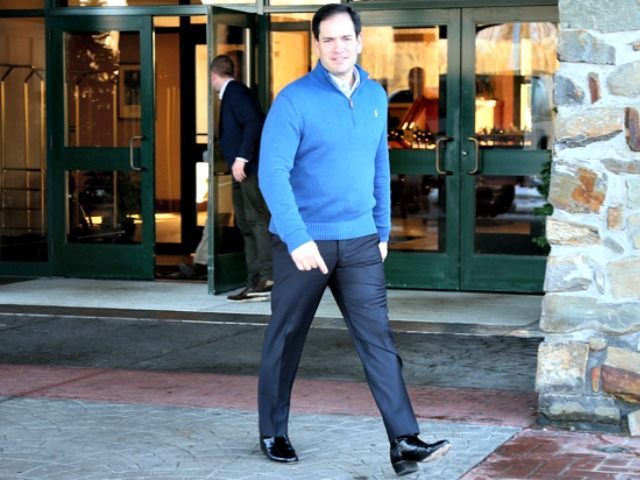After being dogged along the campaign trail by the characterization of being too boyish, donor-class favorite Marco Rubio is now trying his hand at “macho,” according a new report by the New York Times.
In a tongue-and-cheek tone, New York Times reporters Jeremy Peters and Michael Barbaro poke fun at the young Floridian’s effort to rebrand himself in a tougher light. The NYTimes writes:
People might have gotten the wrong impression lately that Marco Rubio is some kind of pointy-toed-boot-wearing fancy-pants. Stop thinking that. Right now.
He owns a handgun. Went to a gun store on Christmas Eve, in fact, because he was just itching to buy one, he told New Hampshire voters last week.
He played football in college and obsesses about it as a fan, as he makes abundantly clear in a new ad. He even married a Miami Dolphins cheerleader.
And no one would be harder on terrorists: He would give them a ‘one-way ticket to Guantánamo, where we’re going to find out everything they know.’ […]
Mr. Rubio is radiating machismo on the campaign trail lately.
While the New York Times reports say, “There is nothing especially effete about Rubio,” GOP frontrunner Donald Trump has suggested that Rubio is a “perfect little puppet” of Republican donors.
Indeed, the report explains that “Mr. Rubio’s conspicuously manly talk comes as rivals have tried to infantilize or even feminize him.”
Rubio’s objection to such characterizations is perhaps surprising given that some of his biggest boosters have emphasized Rubio’s youthfulness and effusive optimism about a New America as his selling points.
For instance, Matt Lewis oozed praised for Rubio in an October column, in which he described Rubio as “boyishly handsome.” In a separate column explaining how Rubio’s age “will be more of an asset than Democrats would like should he win the GOP nod,” Lewis states plainly, “He looks like a kid.”
Similarly, in an extremely pro-Rubio column, New York Times‘ David Brooks writes, “His greatest weakness is his greatest strength: his youth… Rubio is a child of this century.” Indeed, Rubio’s campaign has repeatedly sought to emphasize “New Century” appeal, even though Rubio is in fact a child of the 20th century, born in 1971, and George W. Bush was in fact the first 21st century president. Nearly one-sixth of the 21st century is already in the history books.
But others have not been as impressed with Rubio’s boyishness.
As Camille Paglia observed after the first presidential debate, “What a nice, bright, earnest young man! When he graduates from the college debating team, he will have a rosy future! Oh, er, he’s 44 years old? Computer crash! Rubio is very smooth but also oddly slick…”
The New York Times‘ report suggests that Rubio is now recalculating:
The macho-ization of Mr. Rubio seems aimed not just at blunting the emasculating broadsides from his Republican rivals… [it is also] intended to answer a nagging question among the party’s voters: Can a baby-faced first-term senator handle the challenges of the presidency in a gritty political moment?
As a local New Hampshire reporter noted last month, meeting Rubio “was like watching a computer algorithm designed to cover talking points. He said a lot but at the same time said nothing. It was like someone wound him up, pointed him toward the doors and pushed “play.” If there was a human side to the senator, a soul, it didn’t come across.”

COMMENTS
Please let us know if you're having issues with commenting.